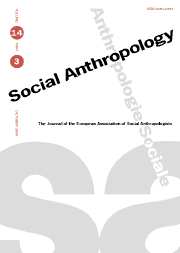The atheist anthropologist: Believers and non-believers in anthropological fieldwork
Published online by Cambridge University Press: 10 July 2006
Abstract
Following a reflection triggered by a fieldwork episode, this paper discusses issues of faith, belief, and personal conviction within anthropological fieldwork and specifically within research carried out in contexts of belief and religious practice. Incorporating fieldwork and biographical accounts taken from research within the (Gypsy) Filadelfia Evangelical Church, I discuss the involvement of personal beliefs and attitudes in anthropological theory and practice, its consequences on the production and circulation of anthropological and interpersonal knowledge, and its importance for the construction of personal relationships within fieldwork contexts. I outline the dynamic and somewhat paradoxical character of this process by comparing two different but sequential field contexts – Lisbon and Madrid.
A la suite d'une réflexion déclenchée par un travail de terrain, cet article aborde la question de la foi, de la croyance, et des convictions personnelles dans le contexte d'une recherche anthropologique, et en particulier pour un terrain ayant trait aux croyances et aux pratiques religieuses. En incorporant des observations et des récits biographiques recueillis lors d'une recherche sur l'Eglise Evangélique (gitane) Filadelfia, je discute le rôle des croyances personnelles dans l'élaboration de la théorie et dans la pratique anthropologique, les conséquences sur la production et la circulation du savoir anthropologique et interpersonnel, et l'importance de ces croyances pour la construction de relations personnelles dans les contextes d'études de terrain. Je passe en revue le caractère dynamique et quelque peu paradoxal de ce processus en comparant deux séjours de terrain différents mais séquentiels, à Lisbonne et à Madrid.
Einem durch eine Episode im Feld ausgelösten Gedankengang zufolge bespreche ich in diesem Papier Fragen rund um Glauben, Gesinnung und persönliche Überzeugung im Rahmen anthropologischer Feldforschung und speziell im Kontext von Untersuchungen religiöser Gesinnungen und Praktiken. Auf Feldmaterial und biographische Gegebenheiten gestützt, die ich während einer Studie der (Zigeuner) Filadelfia Evangelischen Kirche gesammelt habe, bespreche ich die Verwicklung persönlicher Einstellungen und Überzeugungen in anthropologische Theorien und Praktiken, sowie die Auswirkungen auf die Produktion und Verbreitung anthropologischen als auch zwischenmenschlichen Wissens. Darüber hinaus wird auch die Wichtigkeit religiöser Überzeugungen für das Aufbauen persönlicher Beziehungen im Rahmen der Feldforschung hervorgehoben. Ich skizziere die Dynamik und den etwas paradoxen Charakter dieses Prozesses indem ich zwei verschiedene, jedoch aufeinander folgende Feldsituationen – Lissabon und Madrid – miteinander vergleiche.
A partir de una reflexión hecha durante el trabajo de campo, en este documento se discute sobre fe, creencia, y convicción personal en la investigación antropológica y específicamente en el trabajo de campo hecho en contextos definidos por la creencia y práctica religiosa. Al hacer uso de material de campo y testimonios biográficos tomados durante la investigación de la Iglesia (gitana) Evangélica de Filadelfia, discuto que las creencias y actitudes personales se encuentran entrelazadas en la práctica y teoría antropológica, sus consecuencias sobre la producción y circulación de conocimiento antropológico e interpersonal, así como su importancia para la construcción de relaciones personales en el contexto de investigación. Describo el dinámico y de alguna manera paradójico caracter de este proceso al comparar dos contextos de investigación distintos pero secuenciales – en Lisboa y Madrid.
- Type
- Younger Scholars's Forum
- Information
- Copyright
- © Cambridge University Press 2006
Footnotes
- 6
- Cited by




